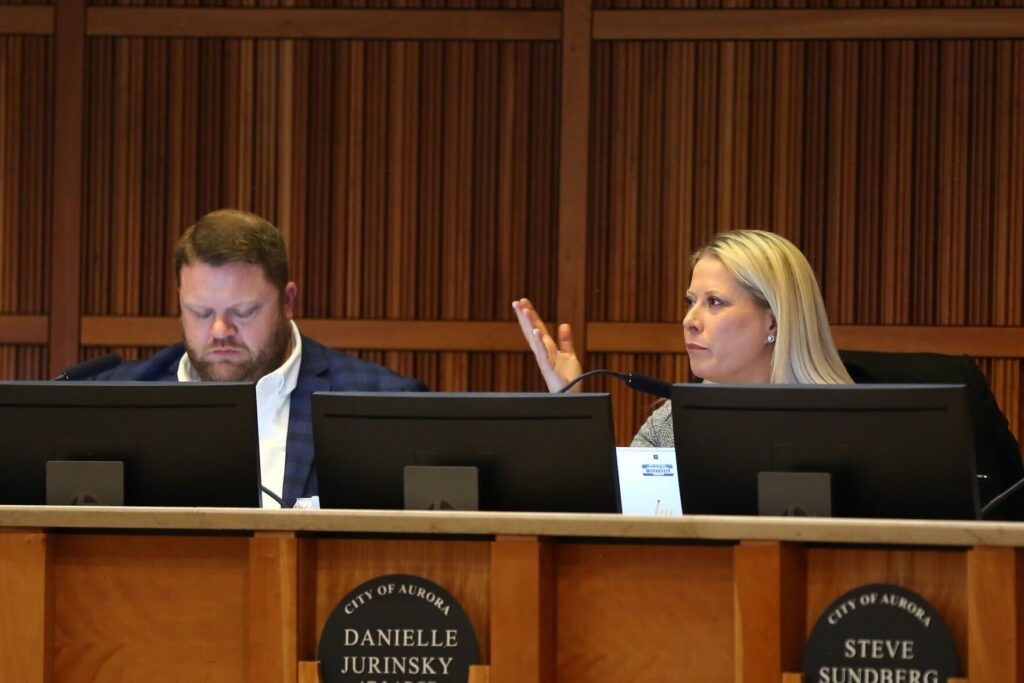Ethics commission delays complaint against Mesa County Clerk Tina Peters

(via YouTube)
The Colorado Independent Ethics Commission granted Mesa County Clerk and Recorder Tina Peters a delay in the ethics complaint alleging she illegally accepted plane rides and other gifts from MyPillow CEO Mike Lindell.
On a 3-2 vote, the commission decided to wait until a grand jury, empaneled by Mesa County District Attorney Dan Rubinstein, comes back with findings and charges, if any, against Peters in that separate case.
In January, Peters attorney Scott Gessler asked the commission to stay its proceedings, saying Peters faces a separate campaign finance complaint largely based on the same set of allegations and arguing the ethics panel should wait until that case has been concluded before deciding whether to move forward. A hearing on that complaint is scheduled for next month.
Gessler added another concern on Tuesday – the grand jury proceedings underway in Mesa County. He warned the commissioners that, should they move forward with the ethics complaint, Peters could assert her Fifth Amendment rights against self-incrimination, given that Rubenstein has stated that anything she says could be used against her.
He also noted that since the commission last met in January, Peters has been arrested and charged with obstruction of justice, after she allegedly resisted authorities’ attempts to seize an iPad under a search warrant.
The complaint before the commission was filed by Anne Landman of Grand Junction, one of two she filed against Peters.Landman’s first complaint, which was at issue Tuesday, alleged Peters accepted plane rides and other gifts in excess of the state gift limit of $65 from Lindell, who espouses unfounded claims that the 2020 presidential election was stolen from Donald Trump. Lindell said in an Aug. 23 video that he flew Peters on his private plane to a cyber symposium on election fraud. In the video, Lindell talks to Peters, stating, “Sorry your hotel was broken into. We’ll get you to a better place and get you some protection.” Landman’s complaint said that infers that Lindell is paying for her housing and security.
Gessler said those elements are also part of the case being pursued by Rubinstein.
Gessler estimated that, with the ongoing investigations and searches, including from search warrants, the grand jury is likely to act within the next three to five months. Should the grand jury return with an indictment, Gessler said he and his client would need to review the criminal complaint before making a decision on seeking a further delay in the commission’s action.

Mesa County Clerk Tina Peters, standing on left, embraces MyPillow CEO Mike Lindell in a video clip Lindell showed on Tuesday on the Lindell TV streaming platform, during a discussion with Peters about law enforcement activity in Colorado earlier that day.
The campaign finance complaint, which is set for a hearing on March 14 and 15, raises more issues of overlap, Gessler told the commission.
“When you look at the reasons and considerations for granting a stay, there is direct overlap” between the criminal investigation and the campaign finance complaints, he said.
“[This] creates real difficulty for Ms. Peters,” Gessler said, “being torn three ways … if the commission goes forward, there’s a possibility that Ms. Peters will invoke the Fifth Amendment.”
The multiple complaints handicap Peters’ ability to present a defense with the commission, Gessler said.
Peters, who maintains her innocence and argues that she was taking necessary steps to preserve election records, announced Monday she intends to run for Secretary of State, although she has yet to file a candidate affidavit for that post. She has filed an affidavit to run for re-election in Mesa County.
Landman, who also participated in Tuesday’s hearing, argued against a delay, in part because of Peters’ decision to run for Secretary of State. Peters would face a June 28 primary, Landman noted.
At least three other Republicans have filed for secretary of state: former Jeffco Clerk and Recorder Pam Anderson, Mike O’Donnell of Kirk and David Winney of Colorado Springs.
Landman noted that it’s not uncommon for someone “engaged in this conduct” to be facing simultaneous investigations; she argued there’s no valid reason to delay the ethics proceeding.
“She is no more deserving of special treatment than the average person,” Landman said.
Landman said if facing a criminal and ethics complaint simultaneously is too much of a burden for Peters, the ethics commission should move forward and conclude its proceedings as soon as possible. She added that Peters could then pay the penalties and fines levied by the commission, and that would save her money on continuing legal fees related to the ethics complaint.
The new developments — such Peters’s candidacy for Secretary of State — make it more urgent that the commission act on the complaint now, Landman said, adding it would be inappropriate for the commission to sweep the complaint under the rug.
“It would be a bad look for the IEC to stay a complaint against someone running for office,” she said, adding voters would be deprived of information they could use to make a decision on the Republican primary race were the complaint to be delayed until after June 28.
Commissioner Sarah Mercer said she is empathetic to Gessler’s argument on the personal burden Peters faces. But she questioned the argument that the ethics investigation is a personal burden, and suggested Peters’ conduct indicates otherwise, including using the investigation “as a platform to launch her campaign” for secretary of state.
Gessler denied that Peters is using the investigations as a platform for running for office.
“She’s responding to accusations,” he said.
Commissioner Cole Wist asked Landman to respond to Gessler’s assertion that a 2020 Colorado Supreme Court case, known as Brown v. Tennison, contains a six-factor test that Gessler said confirms the proceeding should be delayed.
Landman, who is not an attorney, appeared to struggle to answer the question.
“As a Peters constituent … a delay would impact me and anyone else who would vote or not vote” for Peters, she replied.
The commissioners then headed into “closed” session — their version of an executive session — to take legal advice and discuss the request.

Mesa County Clerk Tina Peters booking photo, taken on Thursday, Feb. 10, 2022, when she turned herself in to the Mesa County Sheriff’s Department and was released after paying a $500 bond. Peters is facing a misdemeanor charge of obstructing a peace officer stemming from an incident earlier in the week when officers seized an iPad while serving a search warrant.
Wist, Mercer and Commissioner Annie Kao voted in favor of a Wist motion to stay the proceedings; Commission Chair Elizabeth Espinosa Krupa and Commissioner Serena Baschiera voted against. Baschiera, in explaining her vote, said she would reach a different conclusion if an indictment was eminent. There is a public interest in expedited proceedings, she added.
Although Mercer voted to delay, she added a public interest exists in ensuring elected officials are held accountable on state ethics rules.
“This is not an unending delay,” she said.
The commission also decided to put off a discussion on rulemaking that critics have charged would make the commission less transparent.
Jane Feldman, who served as the commission’s first executive director, said the commission is moving in the wrong direction in making its rules more legalistic, given that under its rules the public must prosecute complaints. Feldman, who has experience in state ethics bodies experience in Colorado and New York, said the Colorado body is the only one in the entire country that puts that burden on citizens rather than handing off the allegations to a commission staffer.
The commission’s model requires an attorney to help, she said.
“You should make this process easier for a member of the public to come forward,” she said.
She cited as an example Wist’s question to Landman about a Supreme Court case.
“Not everyone who has information knows how to access Supreme Court cases or has the education to do it,” Feldman said, adding the Colorado model leads to only people who have resources or knowledge to pursue an ethics complaint in a legal setting.
The commission’s rulemaking, announced in November, did not “redline” the changes in the rules. Instead, the commission provided a link to the new rules, without noting any of the changes, and a four-page “comparative chart” that doesn’t explain any of the specific changes in the rules, either.
That was among the concerns raised by Feldman, as well as the Colorado Freedom of Information Coalition and Colorado Common Cause.
In a December letter to the commission, Common Cause’s Cameron Hill said they are “concerned that the proposed rules give the Independent Ethics Commission broad authority to conduct business outside of public view.”
Hill said that “If adopted, these rules will create an opaque public view of the commission, threatening its integrity. As the institution charged with providing guidance and enforcement of the state’s ethics laws, we believe transparency should be a top priority for Commissioners and Staff. “
The rules, Hill wrote, do not follow the state’s open meetings or open records laws or the state’s Administrative Procedures Act, where “redlining” is a requirement on rules changes.
“While the IEC is an atypical public body, created by the Colorado Constitution, we maintain that there is no specific functional reason why the IEC should be treated any differently from any other state or local ‘agency’ or ‘instrumentality’ when it comes to public accountability and transparency,” wrote Jeff Roberts of CoFOIC in a letter submitted in December to the commission.
Krupa said the the commission should reconsider the legalistic language and postponed discussion until next month.

















